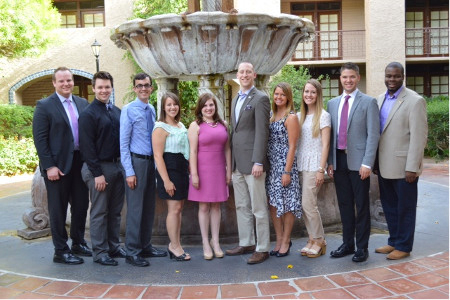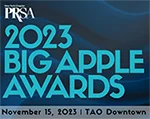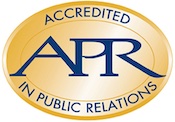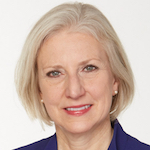PR profs, including Tina McCorkindale and Marcia DiStaso of the PRSA Educators Academy, hail "dialogic looping" (i.e., people talking to each other) as the sine qua non of PR. But they don't practice it.
We e-mailed McCorkindale, DiStaso, 14 other directors of the Academy, and 11 leaders of the Society's Student Assn. after spending a half hour with one of the Society's student leaders at the national conference in Washington, D.C., Oct. 11-14.
 McCorkindale, DiStaso |
Only one of the 27 replied -- a student who declined a free offer of O'Dwyer products.
The student who came to our "exhibit" in the bar of the Marriott Wardman Park had shown fascination with O'Dwyer products including the 330-page Directory of PR Firms; the 68-page October healthcare issue of O'Dwyer's magazine; the 92-page May rankings issue; the 92-page January PR Buyer's Guide issue, and copies of our weekly 8-page online and printed NL.
Asked why the O'Dwyer "exhibit" was in the bar of the Marriott Wardman Park and not with the other 45 exhibitors, we told the student that the Society did not let us exhibit nor even let us enter the exhibit hall, any of the general sessions or the opening night reception (unless we paid $99).
Her curiosity piqued, we gave her the four-page article that exposed (and killed) the Society's practice from 1978-94 of selling copies of authors' articles without their permission. That seemed to make the Society permanently mad at us, we said.
Another article we gave her was three pages on a $21 million lawsuit against the O'Dwyer Co. that involved the Society. We were sued in 1994 by publisher Dean Rotbart after covering his speech at the 1993 Society conference in Orlando.
Tips, Ads Influence Stories
The speech correctly noted that tips and ads often influence story coverage, but we noted that any such influences were unethical under the Society's Code.
The Society had obtained unlimited copyright to the talk and videotaped it with two cameras, intending to make it the centerpiece of a new video library. However, following the O'Dwyer revelations, the Society decided not to sell the tape to anyone.
Rotbart charged inaccurate, malicious coverage of his talk. All charges were dismissed by Federal District Court which called Jack O'Dwyer "a good reporter."
The student drank all this in and we said she could have the Directory and all the other materials in our "exhibit" if she came back at 5 p.m. on Monday, Oct. 13. No other student had visited us. She promised to come by and did so at the appointed time, thanking us profusely for the materials and giving us a bunch of candy as a gift. We asked her to spread the word with her PR professors and Student Society members.
Student Loved it, Why Not Others?
 Since the student was so entranced by our products, walking away with a heavy bag full of them, we figured we'd offer the same materials at no cost not only to the 11 national leaders of the Student Society but the 16 board members of the Educators Academy. Value of the package was $350.
Since the student was so entranced by our products, walking away with a heavy bag full of them, we figured we'd offer the same materials at no cost not only to the 11 national leaders of the Student Society but the 16 board members of the Educators Academy. Value of the package was $350.
The results were not surprising since we have done this test before. The only person answering was a student who said he has several different addresses and so could not get anything from us.
No one wanted any of the materials the student had scooped up with such enthusiasm.
The educational value of the O'Dwyer materials cannot be challenged. So why is there a block on them? The answer is that old style "PR" is being practiced, the kind that increasingly vocal forces want to put six-feet under.
We conclude that the professors have, under the mandate of old-style PR, brainwashed themselves. That's bad enough, but brainwashing students is even worse.
Old-Style PR Is Dead Say Brits, Aussies
What is "dead," according to former Europe, Middle East & Africa Edelman executive Robert Phillips, is the idea that information can be "managed" and that institutions can somehow "implant messages" in target audiences.
Also "dead" to our mind is the idea that people can be blocked from knowing things. Of course, if they don't want to know things, that is another story.
Phillips, who is authoring Trust Me, PR Is Dead, says PR has "abused and exhausted trust" which is "hard-won, every day, by actions, not words." Communications has to be "rooted in actions, not words," he says.
 Goad |
He quotes Pierre Goad, head of communications at HSBC, world's second largest bank with 125 million customers and 6,600 offices, as saying, "Implanting messages doesn't work with five-year-olds let alone 255,000 grown-ups (HSBC employees). We don't waste time crafting the perfect message and the most efficient channel to plant communications in people's heads."
Australian PA Group Sees PR Death
The Centre for Corporate Public Affairs, Melbourne, is saying the same thing—PR was too much involved in "crafting and pushing messages" whereas the new order is based on companies, employees and the public "engaging with each other." Social media is often the venue for this, it notes.
CCPA's five-page article on the topic, titled "PR Is Dead," noted that only one percent of the organizations it surveyed had a "PR" function.
We agree that people are talking more than ever among themselves via social media and that organizations must join the conversation. But SM is only a small part of the web.
Not to be ignored is the fact that people may learn about certain things in SM, but if their curiosity is whetted, they are going to seek answers via the web where many of them will be supplied by traditional media, Wikipedia, and other sources.
"CEOs should beware PR salesmen that talk trust and promise otherwise," says Phillips.
McCorkindale and DiStaso wrote 23 pages on the use of social media for the PR Society's PR Journal, saying numerous times that communication can only take place via "openness, trust and dialogue" (i.e., "dialogic looping"). However, they have failed to dialogue with us.
One indication that the PR Society is mired in past practices is its continued obsession with Accreditation, a program found wanting in numerous ways by consultant Laura Freebairn-Smith.
Featured on the Society's website is this blurb:
Proven Value for 50 Years. Visionary leaders in 1964 established the Accredited in Public Relations (APR) credential as a way to recognize practitioners who have mastered the knowledge, skills and abilities needed to develop and deliver strategic communications. Decades later, as public relations evolved, the APR remains the recognized gold standard for the profession.


 PRSA-NY today announced its five honorary co-chairs for its Big Apple Awards ceremony gala slated for TAO Downtown on Nov. 15.
PRSA-NY today announced its five honorary co-chairs for its Big Apple Awards ceremony gala slated for TAO Downtown on Nov. 15. PRSA-NY president Carmella Glover today issued a "heartfelt apology" on behalf of the chapter for her Oct. 14 message that "caused disappointment and hurt to some of our valued members."
PRSA-NY president Carmella Glover today issued a "heartfelt apology" on behalf of the chapter for her Oct. 14 message that "caused disappointment and hurt to some of our valued members." The leadership of Public Relations Society of America is backing a move to change the current “must-have” APR accreditation to “strongly preferred” as a requirement for a seat on its board of directors.
The leadership of Public Relations Society of America is backing a move to change the current “must-have” APR accreditation to “strongly preferred” as a requirement for a seat on its board of directors. Public Relations Society of American today named Linda Thomas Brooks CEO, succeeding CFO Phil Bonaventura, interim chief since July 2019.
Public Relations Society of American today named Linda Thomas Brooks CEO, succeeding CFO Phil Bonaventura, interim chief since July 2019.


 Have a comment? Send it to
Have a comment? Send it to 
No comments have been submitted for this story yet.